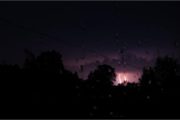It was 1972; the Vietnam war was in full swing and the Iron Curtain still separated West Germany from the countries of Poland, Hungary, Czechoslovakia and East Germany which had been subjugated by Communist Russia.
In an effort to deter further expansion by the USSR, the United States had 250,000 troops stationed in West Germany. I was a member of the small contingent of 5,000 Canadian soldiers stationed there, more as a token of Canadian support for NATO than anything else. I was a member of a 2-man mobile radio relay post, responsible for transmitting multiple channels of radio communication between the Canadians and the Americans. Our vehicle was a 10-wheel 2 1/2 ton truck which carried a communications pod, two 4-cylinder gasoline generators, two extendable 50-foot masts and at least a dozen 5-gallon gerry cans of gasoline. We operated independently of immediate support and would sometimes remain in one location, alone, for up to two weeks at a time. We had a small tent, a kerosene heater, a small stove, personal items, sleeping bags, cots and fresh food and water. Resupply would occasionally visit us to replenish our rations and gasoline.
On one occasion we were set up on a hill. An American communications platoon was set up in a gravel pit near but below us. There was an American tank division in a wooded area down the hill from us.
Being mature, experienced soldiers, regulations were lax and we were permitted to have beer in our supplies for our off-duty leisure times. We were befriended by a young 18-year-old American soldier who was surprised that we were allowed to have beer as he was not. When he asked if he could buy some beer and leave it with us we agreed. However after sharing some beer together one evening, he showed up the next day with several cuts and contusions on his body. He had fallen off the steep edge of the gravel pit! The story does not end there. While we were in that location, a USO entertainment group came to perform for the troops in the tank division. The young soldier invited us to join him to see the show and as only one of us was required to be on duty at a time, I went first.
There were many American military present. With my Canadian Army uniform I stood out like a sore thumb. Inevitably, when a person from a different country is encountered, a common question that arises is: “where are you from?” The young soldier pointed out a colleague whose pride and joy was that nobody had ever heard of his hometown. Our young buddy told me the name of that town and wouldn’t you know it, eventually that soldier came to talk to me. And of course, the topic of where we came from arose.
He said, “no one has ever heard of my hometown.”
I couldn’t resist. I rubbed my chin,frowned, and replied “Would it be ….” and I named his hometown.
His jaw dropped in amazement. “How did you know that!!” he exclaimed.
“Well,” I replied, “It’s your accent.”
For the rest of the evening I saw him talking to others and pointing to me. I’m sure he was telling everyone that I had known where his hometown was by his accent.
As I tell my grandchildren this story, I wonder if that American soldier ever found out about my deception, or if he is telling his grandchildren about the Canadian language expert he met long ago in a forest in Germany.

Martin LaHaise





Kim6 years ago
Marty, this is a great story and I’am sure that you will have many more to write. I will have to ask my hubby if he knew you in 🇩🇪
Martin LaHaise6 years ago
Thanks Kim. What is your husband’s name? Message me if you don’t want that public.